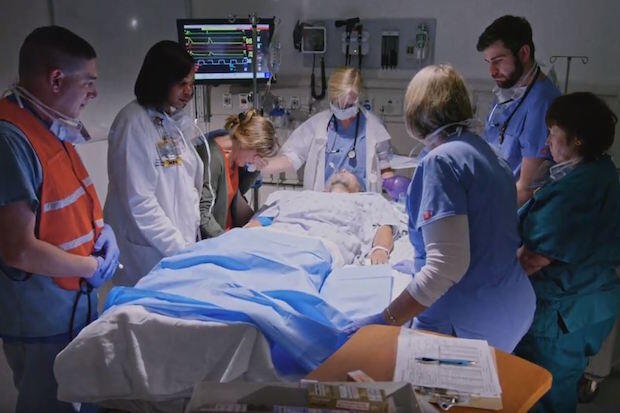
Nov. 16, 2018
Pausing to honor a life
Share this story
On a typical day, the VCU Medical Center Emergency Department treats 300 patients. The department, a Level I trauma center geographically situated on the main corridor from Maine to Miami, sees some of the worst tragedies from up and down the East Coast: shootings, mass-casualty incidents, freak accidents and multi-vehicle pileups. Despite every quick action and resuscitation effort made by medical team members, lives are lost and friends and families are left to grieve.
But for the medical team in the midst of a 12-hour shift, there is no time to grieve as their minds and bodies race to save the dying patient in the next bed. Operating in such a relentless environment can lead to exhaustion and burnout. With a recent study finding that nearly two-thirds of U.S. doctors feel burned out, depressed or both, something as simple as taking a moment to reflect after each patient’s death could not only allow providers to be more present for each patient, but build resiliency within the staff.
That is why Julie Kacmarcik, clinical coordinator in the emergency department, and a dedicated team brought the seemingly simple — but oftentimes difficult to personally justify — concept of “The Pause” to VCU Medical Center.
The Pause
The Pause is 30 to 45 seconds of silence immediately after the death of a patient to honor his or her life, and distinctly mark the importance of the moment at hand. It is a brief timeout for everyone involved in the events leading up to the death to collect, reflect and help bring closure. Beyond that, it’s a moment to acknowledge the tremendous effort and care offered by the health care team.
“We’re looking at a person in a bed who didn't plan on coming in to see us that day, and didn't expect their life to be ending. This is a brother, a friend, a dad,” said Kacmarcik, a 23-year veteran of the emergency department. “And we acknowledge and recognize the team that gave their heart and soul to try and resuscitate this patient. It’s realizing that, yes, I’m thinking about all the other folks we have to take care of, but just for this finite period of time, I’ll be in the moment with this patient and with my team members.”
As Russell Davis, Ph.D., VCU Health director of pastoral care, puts it, “It is an expression of our humanity. It allows for silent expression of real human emotions.”

Formalizing a moment in time
Recognizing the emotional needs of her team members three years ago, Kacmarcik and the emergency department team started making concerted efforts to cope and debrief together after traumatic medical situations. However, it wasn’t until 2016, when VCU Health connected with Jonathan Bartels, palliative care nurse liaison at the University of Virginia, that they put a name to it.
Bartels, who has a passion for promoting resilience in health care, originally developed the concept of The Pause.
“It is either implicit or explicit in our training as health care providers that we’re taught professionalism. Professionalism around death is this: Don’t acknowledge your feelings. Walk away. Death is a loss. Death is the enemy. Move on. Separate yourself from the pain. Keep busy. … Don’t acknowledge that you are human,” Bartels told a group of VCU student, faculty and staff when he visited VCU Medical Center on Nov. 15.
“[But] each and every one of us — whether we're physicians, nurses, techs, aids, students going into healthcare — we all go into really intense situations,” he continued. “Going into those situations, walking back out and think you’re not going to be affected? That’s like going into water and walking out saying you’re not going to get wet. We all get wet, everyone does. You just have to learn how to dry off.”
We’re looking at a person in a bed who didn't plan on coming in to see us that day, and didn't expect their life to be ending. This is a brother, a friend, a dad. … It's realizing that, yes, I’m thinking about all the other folks we have to take care of, but just for this finite period of time, I’ll be in the moment with this patient and with my team members.
Pausing after every hospital death
The Pause is proving successful in promoting mindfulness in practice, but also in pulling people closer as a team, and creating more effective communication among providers.
“Say there was a cardiologist or ICU consult at the bedside, which then became a code situation with an unsuccessful outcome. The team then took a moment to institute The Pause,” Kacmarcik said. “We may not know all those people, but we form a mutual respect. We can look at each other later and think, ‘We were in the trenches together for a little bit and we made a difference to the patient and each other.’”
Bartels’ Nov. 15 visit marked the official VCU Health systemwide rollout of The Pause, meaning it will expand from its current use in the emergency department to use after the death of every patient at VCU Medical Center. For the past year, Davis, Kacmarcik and a Pause steering committee have been working tirelessly to encourage the act in every department.
Kacmarcik, Davis and members of the steering committee say they are spreading one message for one simple act: They pause because they care — for the patient and his or her family, and for their team and themselves.
Subscribe to VCU News
Subscribe to VCU News at newsletter.vcu.edu and receive a selection of stories, videos, photos, news clips and event listings in your inbox.







